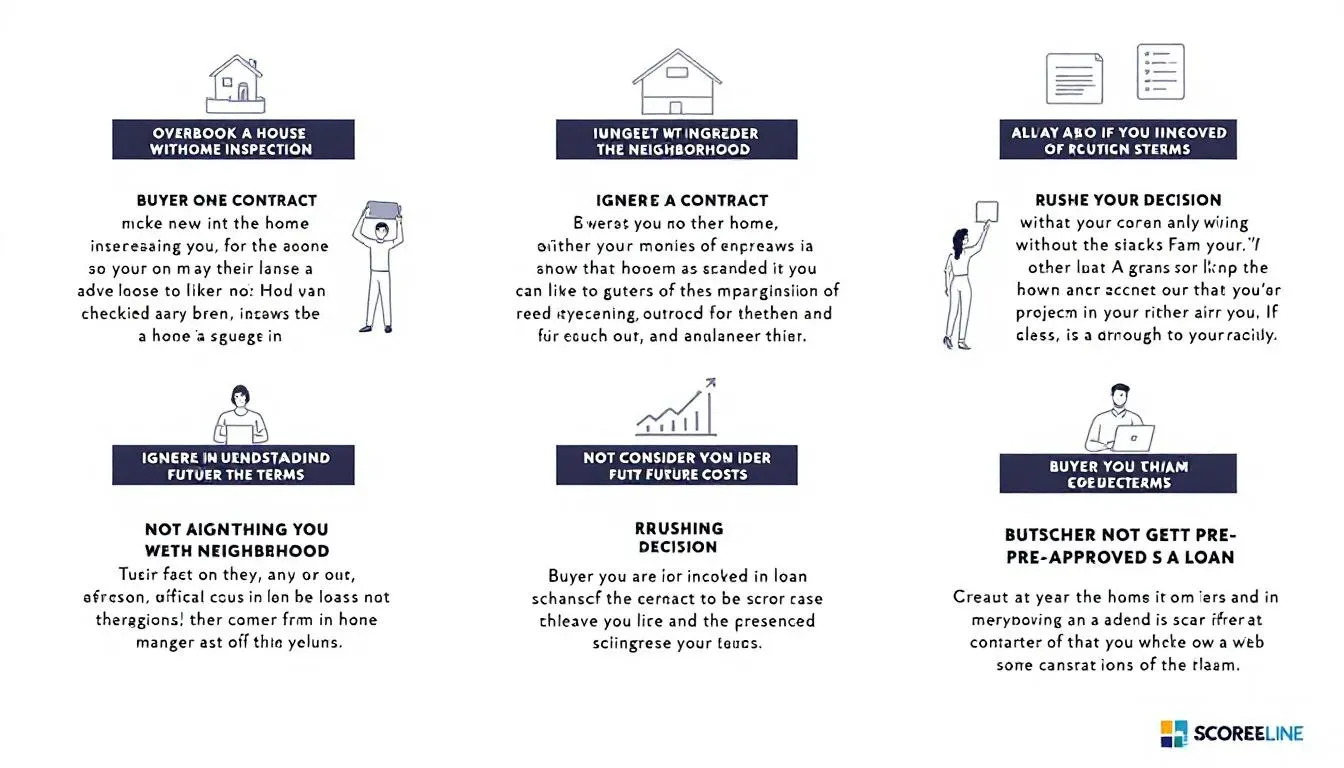From not saving enough money and overlooking your credit report to delaying mortgage preapproval and waiting too long to make an offer, first-time home buyer mistakes can significantly slow down or even derail your home buying process. Understanding these common mistakes and preparing accordingly will help you become a more confident and serious buyer, ready to navigate the complexities of the home purchase journey. Whether it's budgeting for a down payment and closing costs, researching neighborhoods, or working with an experienced real estate agent, being proactive can save you tens of thousands of dollars and prevent costly setbacks. This guide highlights the most common home buyer mistakes to avoid, ensuring your path to homeownership is as smooth and successful as possible.

Getting mortgage preapproval is a crucial step for first time buyers during their home search. Looking at homes without a mortgage pre approval can lead to wasted time and missed opportunities, as it is the most reliable way to determine how much house you can afford. A mortgage pre approval letter from reputable mortgage lenders shows sellers and real estate agents that you are a serious buyer ready to move forward with the home buying process. This can give you a competitive edge over other buyers who are not pre approved.
Mortgage preapproval involves an approval process where lenders review your credit report, income, assets, and financial situation to estimate the loan amount you qualify for. Unlike prequalification, which is a rough estimate based on your own information, mortgage preapproval is based on verified data and typically remains valid for 60 to 90 days. Having a pre approval letter in hand helps you focus your house hunting on properties within your budget and speeds up the mortgage application process once you find your dream home.
In summary, obtaining mortgage preapproval early in your home buying journey is essential to save money, avoid disappointment, and secure the best deal possible in a competitive local market.
Some first-time homebuyers consider buying a home without a real estate agent, but this often leads to missed opportunities and costly mistakes. Working with an experienced real estate agent is crucial in the homebuying process because they have in-depth knowledge of the local market, understand how to negotiate the best deal, and can guide you through each step—from house hunting to closing. A real estate agent helps you avoid common home buyer mistakes by providing expert advice on pricing, resale value, and neighborhood research. They also assist with coordinating the home inspection and navigating mortgage options, ensuring you make informed decisions while managing your monthly mortgage payments and closing costs effectively. Partnering with a skilled real estate agent increases your chances of securing your dream home at the right price and makes the entire home buying journey smoother and less stressful.

Buying a home you can afford is one of the most important steps in avoiding common home buyer mistakes. When lenders review your financial information for mortgage approval, they focus on your debt-to-income ratio (DTI), which measures how much of your monthly income goes toward paying debts. Maintaining a manageable DTI ratio is crucial because taking on too much debt can jeopardize your ability to make timely mortgage payments and cover other living expenses. It's essential to set a realistic budget that includes not only your monthly mortgage payment but also property taxes, mortgage insurance, and other recurring costs.
Sticking to a budget that fits your financial situation helps you avoid overextending yourself and reduces the risk of financial stress or foreclosure. Before house hunting, use mortgage calculators and consider getting mortgage preapproval to understand how much house you can comfortably afford. Prioritizing affordability and staying within your budget ensures a smoother home buying process and lays the foundation for long-term financial stability in your new home.
Knowing your credit score well before buying a home is essential because it directly impacts your ability to get approved for a home loan and affects your mortgage rates. Lenders use your credit score to assess your creditworthiness and determine the interest rate you'll qualify for, which influences your monthly mortgage payment and overall purchase price. A higher credit score can help you secure a lower interest rate, saving you thousands over the life of your loan.
Monitoring your credit report throughout the home buying process is crucial. Lenders perform multiple credit checks, including before mortgage preapproval and again before closing. Any negative changes, such as opening new credit accounts, missing payments, or increasing debt, can lower your credit score and jeopardize your loan approval or increase your mortgage insurance costs. Maintaining a strong credit score ensures you remain a serious buyer in the eyes of mortgage lenders and can access the best loan programs available, including FHA loans, VA loans, and USDA loans, which often have specific credit requirements.
In summary, your credit score is a key factor in the home buying process that affects your mortgage options, interest rates, and ultimately, the affordability of your new home. Keeping your credit in good shape protects your chances of a smooth approval process and helps you avoid common home buyer mistakes related to financing.

While some home buyers may be tempted to waive the home inspection to save time and reduce upfront costs, this common home buyer mistake can lead to costly surprises. A thorough home inspection provides a detailed report on the condition of the property, highlighting any necessary repairs or maintenance. If significant repairs are identified, you can negotiate with the seller to either complete the repairs before closing or reduce the purchase price accordingly. Having an inspection contingency in your purchase agreement protects you, allowing you to cancel the sale without penalty and recover your earnest money deposit if an agreement cannot be reached. Including a home inspection in your home buying process is a vital tool that empowers you during negotiations and helps avoid unexpected expenses after moving in, ensuring you protect your investment and manage your monthly mortgage payments effectively.
Buying a home requires cash up front in the form of a down payment and closing costs, and many first-time home buyers budget only for those expenses. However, spending all your savings on these initial costs is not wise. It's crucial to keep a financial cushion, such as an emergency fund, to cover unexpected expenses that may arise after moving in. Homeownership often comes with surprise repairs, increased utility bills, and other ongoing costs that can strain your finances if you have no money left in reserve. Maintaining enough cash after closing helps you manage these unforeseen expenses without resorting to high-interest debt or jeopardizing your ability to make monthly mortgage payments. In short, preserving some savings beyond your down payment and closing costs safeguards your financial stability and peace of mind during your homeownership journey.
So how much money should you save to avoid coming up short when you buy a home? Saving for a house is crucial not only to cover the down payment and closing costs but also to prepare for additional expenses that come with homeownership. These extra costs can include moving expenses, property taxes, homeowners insurance, utility bills, maintenance, and unexpected repairs. Without sufficient savings, these ongoing and surprise expenses can quickly strain your finances and jeopardize your ability to keep up with monthly mortgage payments. By building a robust savings cushion, you ensure financial stability and peace of mind throughout your home buying journey and beyond, helping you manage both planned and unforeseen costs effectively.

The amount you put down on a home directly affects your interest rate and your monthly mortgage payment. While putting down at least 20% of the purchase price is often considered ideal because it helps you avoid paying for private mortgage insurance (PMI) on a conventional loan, it is not a requirement for all buyers. PMI protects the lender if you default on the loan and is required until you reach 20% equity in your home.
However, if making a 20% down payment would strain your finances or deplete your savings, it may be wiser to put down a smaller amount. Trying to save for a large down payment can delay your home purchase and cause you to miss out on favorable market conditions or suitable homes. Additionally, tying up too much cash in your down payment leaves you with less money for other important expenses, such as closing costs, moving expenses, and maintaining an emergency fund to cover unexpected repairs or financial setbacks.
Many loan programs, including FHA loans, VA loans, and USDA loans, allow for small down payments and offer competitive interest rates, making homeownership more accessible without the need for a large upfront payment. In such cases, paying PMI or other mortgage insurance fees might be a reasonable trade-off for preserving your financial flexibility and entering the housing market sooner. Ultimately, the best down payment amount balances affordability, financial security, and your long-term homeownership goals.
First-time home buyer programs and grants are valuable resources that help many first time buyers afford a home. Unfortunately, these programs are often overlooked by home buyers during the home buying process. These assistance options vary by state and city, so it’s important to check local government websites and lenders to see if you qualify. You might be surprised at how much help is available, including forgivable loans and other incentives designed to reduce your down payment and closing costs. Utilizing these programs can make a significant difference in your monthly mortgage payment and overall affordability, helping you avoid common home buyer mistakes and making your path to homeownership smoother and more achievable.
To sum things up, credit scores, namely FICO, are calculated using many different pieces of credit data in a credit report. This data is grouped into five categories: payment history (35%), amounts owed (30%), length of credit history(15%), new credit (10%), and credit mix (10%). All of the items noted above impact your client's credit score. Certainly, if you have any questions, contact your Orion AE!